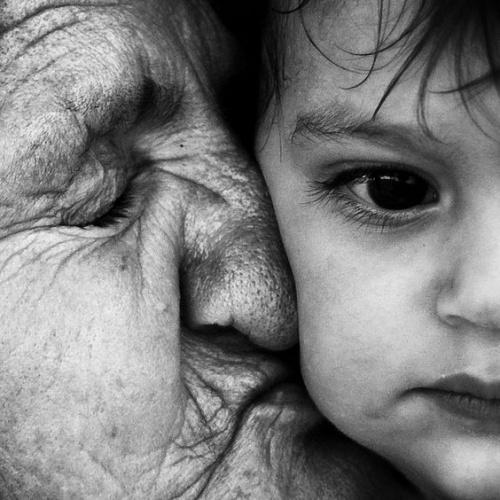Forced Affection: Why we shouldn't force our children to kiss and hug

But, is it okay to force your child to establish physical contact or affection when he doesn’t want to? What message are you sending to your child about physical limits when you do this? Forced affection? Yay or nay?
Forced affection: Are we sending our kids the wrong message?
Many people are against forced affection because they believe it teaches children to cover up their true feelings. Others see forced affection as manipulative. But there’s more to it than that.
When we force our children to be affectionate against their will, we’re telling them they don’t own their own bodies. We’re teaching them that any adult can force them to do things with their bodies even when they don’t want to.
Author Katia Hetter addresses this issue in her CNN article “I Don’t Own My Child’s Body.” She states that forced affection – making children touch someone when they don’t want to – makes them vulnerable to child abuse.

Though this claim may seem like a ridiculous exaggeration, child psychology raises its voice on this issue in support of Hetter’s theory. Nichole M. stated that when you force your child to show affection, “You’re violating their comfort zone and the kids will learn to accept anyone into those uncomfortable spaces.”
“Children should never be touched if this makes them uncomfortable, even by family members. They should never be forced to kiss someone. Their kisses and hugs are their own and are not an obligation. Children can choose when and to whom to give their affection and we adults should respect them. Their bodies are their own and the decision is their own.”
-Katia Hetter-
The CNN specialist also affirms that forcing children to show affection against their will affects their relationships during adolescence as well. “Ordering children to kiss or hug an adult they don’t want to touch teaches them to use their bodies to please you or someone else in authority or, really, anyone,” Hetter writes.
How to deal with these situations
What better than to be a positive role model for your child? Don’t be ashamed to ask adults to leave your child alone and not coerce him. In this context, you should always respect and prioritize your child’s wishes over those of adults.
A parent’s ability to establish healthy limits is key. Of course, you want to set limits that favor your child’s relationships with others. But you must also keep in mind the time your child needs to adapt. It is never acceptable to offend or ridicule your child. Nor should you allow anyone else to do so.
Teach children to respect their own bodies
Teaching your children to respect their own bodies is paramount. In order to do this, they must learn about limits regarding others who invade their personal space.
Children need to understand that no one should ever touch them if this makes them uncomfortable. Furthermore, children should comprehend that they themselves have the right to make decisions regarding their own bodies. They dictate who is allowed into their personal space.
It’s important that our children feel free to decide. We have to explain to them that they have the power to decide if they want to hug or kiss someone.
A child should never feel like these actions are compulsory. Rather, we need to teach our children to listen to their own feelings and instincts. This is an important starting point.

Dealing with the hurt of the rejected relative
We should never place refusing to show affection in the category of misbehavior. We shouldn’t consider it a lack or respect or manners either.
Katia Hetter clarifies that children can show good manners and be respectful while also maintaining personal limits. “Manners – treating people with respect and care – is different than demanding physical displays of affection.”
The first step involves explaining our policy to those around us. They, in turn, must be willing to accept this position. This decision will likely require some work. However, it will help others to truly appreciate the affection your little one does show.
You can give your children the option of greeting their loved ones in a less intimate way. For example, they can replace hugs and kisses with handshakes, high fives, or fist pumps. If your child is shy, these are great ways to teach her to treat others with care and respect.
As you can see, there is no reason to get frustrated or annoyed if your child doesn’t want to show affection to others. You can simply speak to those in question and teach your child other more comfortable ways to greet. This isn’t about pressuring your child, but rather working together toward a positive solution.
What about you? What is your stance now regarding forced affection? What is your opinion on the information in this article? What solutions have you found regarding uncomfortable daily encounters?
All cited sources were thoroughly reviewed by our team to ensure their quality, reliability, currency, and validity. The bibliography of this article was considered reliable and of academic or scientific accuracy.
- Chapman, G., & Campbell, R. (2016). The 5 love languages of children: The secret to loving children effectively. Moody Publishers. https://books.google.es/books?hl=es&lr=&id=pfKZCwAAQBAJ&oi=fnd&pg=PT7&dq=chapman+love+languages+children&ots=xO1a6ImL6k&sig=-iqIiSpzC4lgZyog0Q10yiByfvY#v=onepage&q=chapman%20love%20languages%20children&f=false
- Naval-Duran, C. (2005). Ámbito familiar: confianza y respeto. Recuperado marzo de 2021 de https://dadun.unav.edu/bitstream/10171/36803/1/%C3%81mbito%20familiar%20(confianza%20y%20respeto).pdf
- Garrido-Rojas, L. (2006). Apego, emoción y regulación emocional. Implicaciones para la salud. Revista latinoamericana de psicología, 38(3), 493-507. https://www.redalyc.org/pdf/805/80538304.pdf
This text is provided for informational purposes only and does not replace consultation with a professional. If in doubt, consult your specialist.








